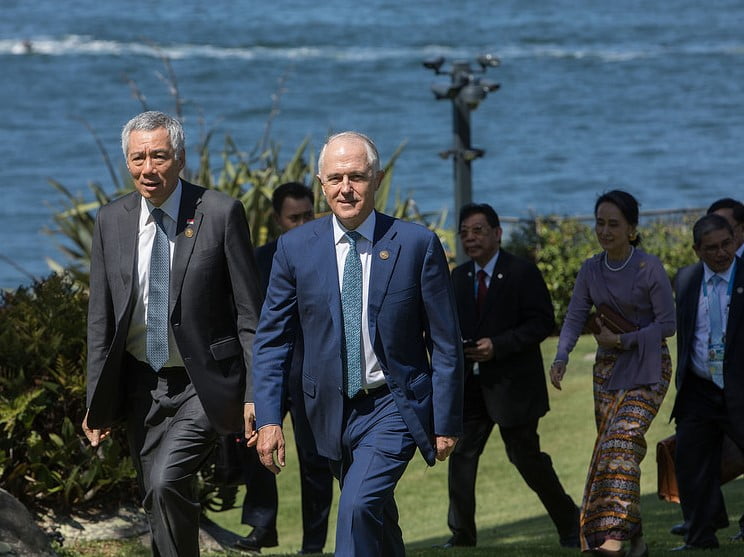Recent fears within Australia’s tech and innovation circles that the sector might have been forgotten by its friends in Canberra may be overblown if the first ASEAN-Australian summit hosted in this country is any guide.
The inaugural event’s agenda seemed built on a policy wireframe that put the digital economy at the centre, and was design to grow long-term prosperity via a more integrated regional economy.
Innovation was one of the summit’s outstanding themes, and technology played a prominent role in new policy initiatives, stretching across everything from trade and economic development to the region’s counter-terrorism response and even urban planning.

The heads of ASEAN’s member states officially adopted The Sydney Declaration — a document peppered with initiatives that recognise the advance of the digital revolution and its role in the region’s future.
Australia’s trade with ASEAN hit $100 billion in the 2017 financial, making the bloc our third largest trading partner and, according to Prime Minister Malcolm Turnbull “nowhere is the potential for digital trade greater than in our region”.
The first of the major technology-centric initiatives flow from the summit was a digital initiative aimed at streamlining digitally-derived global commercial activity.
The initiative would create new, harmonised standards to smooth friction from the digital trade within the region; removing disruptive local regulations and other barriers.
Mr Turnbull framed the initiative as a way to encourage micro and small-and-medium size businesses to look for opportunities within ASEAN. However, the leaders also pointed to the anticipated arrival of the Regional Comprehensive Economic Partnership — the ambitious plan to establish an ASEAN-centric free trade region, which began as a negotiation launched in Cambodia in 2012.
Commenting on the pace of change brought about digital trade in opening remarks the summit’s business conference, Mr Turnbull said: “It’s moving much faster than legislators, regulators and policy makers to be frank”.
The government also unveiled a $30 million plan over the next five years to help Southeast Asian countries use smart technology to equip their cities for skyrocketing urban expansion.
Dubbed the ASEAN-Australian Smart Cities initiative, its funding would go toward helping experts throughout the region share development experiences using technology to make cities more sustainable and liveable.
Speaking at press conference at the close of the summit alongside Singapore’s Prime Minister Lee Hsien Loong, Mr Turnbull said that businesses were more attuned to global developments in their fields than government policy makers, and that the smart cities initiative would help bridge that gap.
“If you take smart cities, we’re all grappling with the same problems so, it’s important to know what others are doing,” he said.
Commenting on the adequacy of the investment in the initiative, Mr Lee said that the challenge of smart cities lay in the implementation of the plans rather than the amount of money thrown at the planning stages.
“As and when attractive projects come up, as will happen, those projects will have no difficulty finding funding,” Mr Lee said.
Arguably the largest tech-inspired policy response from the summit concerned its potential for harm, rather than optimism for its ability to deliver economic and social prosperity.
Following the ASEAN counter terrorism forum, leaders agreed to an ambitious and expansive range of legislative and intelligence sharing measures intended to curb the use of technology used to facilitate and conceal violent extremist organisations.
Wrapped tightly within the summit’s ongoing narrative of a deeper regional collaboration, the measures were set out in a new counter terrorism MoU signed by ASEAN leaders and a new transnational agreement to share cyber intelligence and resources.
The MoU includes an agreement to try coordinate regional laws around gathering and using electronic evidence to pursue terrorists through a series of ASEAN-Australian workshops.
The focus on clandestine internet activity is being driven by concerns that ISIL operatives retreating from conventional battle in Northern Iraq and Syria might use technology to smuggle their activities across borders and seek out and radicalise sympathisers among the region’s 300 million Muslims.
Malaysia’s President Nadjib Razak warned that the humanitarian crisis involving the violent expulsion of Rohingya Muslims from Mynamar’s Rakhine province had created a particularly fertile recruitment ground for extremists that threatened the entire region’s stability.
Prime Minister Turnbull said the ability to use encrypted messaging platforms to transmit terrorism instruction material across borders undetected posed a particularly steep challenge for law enforcement, as did with the use of crypto-currencies and shady online crowd sourcing platforms to disguise terrorist financing.
“As leaders said this morning, nowhere is far away from anywhere when it comes to terrorism and none of us can tackle this threat alone,” Mr Turnbull said.
“The threat is global and technology in many ways has amplified the problem. The use of social media and encrypted messaging applications is a challenge for us all and one that we must tackle together — the laws that apply offline must apply online,” he said.
Do you know more? Contact James Riley via Email.

